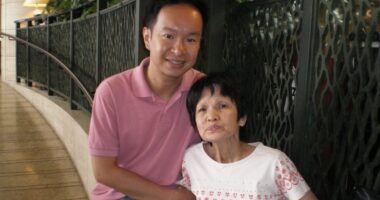Will Huntington’s change the way my wife prefers I show my love?
How cognitive decline might affect her ability to appreciate my efforts

“Do you think the way people like to be shown love ever changes?” my wife, Jill, recently asked me as we were making the bed.
“What a simple yet complicated question,” I replied, wondering where this conversation was going.
Her next question deepened the mystery. “Do you think Huntington’s disease will change the way I like to be shown love?”
I learned a long time ago that I should never assume to know what Jill is thinking, so I asked, “What do you mean, exactly?”
As Jill started to very neatly pull up her side of the bedspread, she looked at my side. At first, I didn’t get it. But then I realized she was looking at how we each made our side of the bed.
Her side was perfect and neat, but mine was not.
She said, “Huntington’s causes cognitive decline. I’ve already experienced some memory loss, and learning is getting more difficult. Will I one day stop appreciating that you try to be less messy? Will I no longer see the effort you put into cutting food or folding towels the way I like? Will I get mad that you don’t do things the way I want them done, and lose the ability to understand that everything can’t be perfect?”
Love is in the effort, not the outcome
To understand her questions, you need to know that Jill doesn’t view flowers and chocolate as signs of love. There’s two reasons for that: Not only is she allergic to them, but she also doesn’t like to receive presents.
You read that correctly. Jill doesn’t want physical gifts. She prefers I write love notes or fill up her gas tank, rather than buy her an expensive necklace. (For the record, she’d also prefer I didn’t use as many puns in the love notes, but she has “groan” to love them.)
Jill also said she’d love to do laundry and fold towels with me instead of going to a fancy dinner. When we got married, she told me she likes things done a certain way. She showed me how she liked towels folded, how she liked the refrigerator and freezer organized, and how she cut foods while cooking. But as hard as I tried, I’m not as neat as she is, so my outcomes look different from hers.
Jill accepted that I couldn’t do certain things as precisely as her. She figured that we think differently: Her brain is a Tetris game while mine is Scrabble.
When I got upset at myself for not doing things Jill’s way, she’d remind me that she has a hard time standing in a line for more than two minutes — which is why I gladly do it for her. She doesn’t remember where the little door to the gas cap is on her car, so every week, I fill her tank. She has a hard time with punctuation, so for 15 years, I have edited everything she’s written.
We work with our individual strengths and weaknesses by taking on different roles. Jill folds the towels, and I put them away. I bring groceries inside, and Jill organizes the kitchen while putting them away.
We may never do things exactly how the other would prefer, but we’ve agreed the effort we put into trying is how we show each other love.
As we finished making the bed, I looked at Jill and told her it could happen: the way she shows love and wants love shown to her could change. Huntington’s may affect her processing, but I figure we will cross that bridge when we get to it.
For now, I told her if she ever decides she wants chocolates and flowers instead of my puns, I will happily change how I show my love. She smiled and told me she wasn’t sure what would be better — experiencing an allergic reaction that causes hives, or rolling her eyes after hearing my puns. She said she would think about it and get back to me.
I responded the only way I could in that situation: “I love you a choco-lat!”
Note: Huntington’s Disease News is strictly a news and information website about the disease. It does not provide medical advice, diagnosis, or treatment. This content is not intended to be a substitute for professional medical advice, diagnosis, or treatment. Always seek the advice of your physician or other qualified health provider with any questions you may have regarding a medical condition. Never disregard professional medical advice or delay in seeking it because of something you have read on this website. The opinions expressed in this column are not those of Huntington’s Disease News or its parent company, Bionews, and are intended to spark discussion about issues pertaining to Huntington’s disease.







k
this means a lot to someone going through the same things. thank you for all you do in helping me know where this is headed and how to see the positive.
Carlos Briceño
Thank you for reaching out. My heart goes out to you, knowing that you are experiencing the same issues. Sadly, to see the positive, you have to go through the negative, so I will keep you in my thoughts as we all continue our journey: the good and the bad.